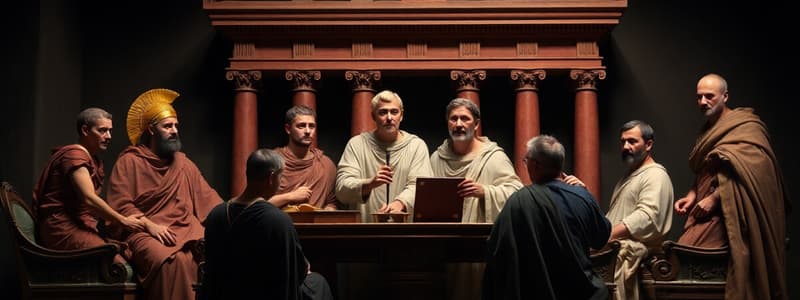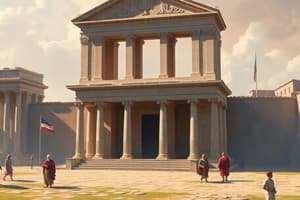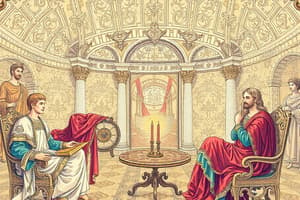Podcast
Questions and Answers
What was one of the primary responsibilities of the censors in ancient Rome?
What was one of the primary responsibilities of the censors in ancient Rome?
- Establishing trade agreements
- Conducting the census (correct)
- Judging criminal cases
- Crafting laws
Censors had the authority to grant Roman citizenship to anyone regardless of moral conduct.
Censors had the authority to grant Roman citizenship to anyone regardless of moral conduct.
False (B)
How often were censors elected in ancient Rome?
How often were censors elected in ancient Rome?
Every five years
Censors had the power to punish moral offenses such as ________.
Censors had the power to punish moral offenses such as ________.
Which of the following positions allowed Roman politicians to extend their authority into provinces?
Which of the following positions allowed Roman politicians to extend their authority into provinces?
Promagistracies were typically held by individuals with no previous officeholder experience.
Promagistracies were typically held by individuals with no previous officeholder experience.
What was a significant impact of the censors on the political landscape of Rome?
What was a significant impact of the censors on the political landscape of Rome?
Promagistracies combined administrative, military, and ________ responsibilities.
Promagistracies combined administrative, military, and ________ responsibilities.
Match the following terms with their descriptions:
Match the following terms with their descriptions:
What was one of the criticisms of the Cursus Honorum system?
What was one of the criticisms of the Cursus Honorum system?
The Cursus Honorum ensured equal access to political positions for individuals from all socioeconomic backgrounds.
The Cursus Honorum ensured equal access to political positions for individuals from all socioeconomic backgrounds.
Who were two prominent figures that followed the Cursus Honorum?
Who were two prominent figures that followed the Cursus Honorum?
The Cursus Honorum contributed to the rise of powerful political ______.
The Cursus Honorum contributed to the rise of powerful political ______.
Match the following Roman figures with their contributions to the Cursus Honorum:
Match the following Roman figures with their contributions to the Cursus Honorum:
How did the Cursus Honorum serve future leaders?
How did the Cursus Honorum serve future leaders?
The Cursus Honorum only benefited individuals with military backgrounds.
The Cursus Honorum only benefited individuals with military backgrounds.
What was the purpose of the lex Villia Annalis introduced in 180 BCE?
What was the purpose of the lex Villia Annalis introduced in 180 BCE?
The Cursus Honorum was solely a tool for creating a populist political system.
The Cursus Honorum was solely a tool for creating a populist political system.
What were promagistracies, and why were they significant in the Cursus Honorum?
What were promagistracies, and why were they significant in the Cursus Honorum?
The rise of powerful individuals like _____ and _____ led to the circumvention of the traditional cursus.
The rise of powerful individuals like _____ and _____ led to the circumvention of the traditional cursus.
Match the changes in the Cursus Honorum with their effects:
Match the changes in the Cursus Honorum with their effects:
What effect did the Cursus Honorum have on Roman society's structure?
What effect did the Cursus Honorum have on Roman society's structure?
The Cursus Honorum was primarily a tool for maintaining social order in the Roman Republic.
The Cursus Honorum was primarily a tool for maintaining social order in the Roman Republic.
How did reforms to the Cursus Honorum reflect changes in the power dynamics of the Late Roman Republic?
How did reforms to the Cursus Honorum reflect changes in the power dynamics of the Late Roman Republic?
The Cursus Honorum transitioned from a system of order to a tool for _____
The Cursus Honorum transitioned from a system of order to a tool for _____
Flashcards
Cursus Honorum
Cursus Honorum
A structured path to political advancement in the Roman Republic, involving a series of offices.
Political Advancement
Political Advancement
The process of climbing the ranks of political power.
Political Factions
Political Factions
Groups of influential people with similar political goals, who may compete for power.
Clientelism
Clientelism
The practice of exchanging support for favors or political influence, often with wealthy patrons
Signup and view all the flashcards
Julius Caesar
Julius Caesar
A prominent Roman figure who rose through the Cursus Honorum, eventually becoming a dictator.
Signup and view all the flashcards
Social Inequality
Social Inequality
Unequal distribution of resources and opportunities within society.
Signup and view all the flashcards
Political Manipulation
Political Manipulation
Using power or resources to control an outcome, often for personal gain in political advancement
Signup and view all the flashcards
Cursus Honorum
Cursus Honorum
Prescribed path of political advancement in the late Roman Republic.
Signup and view all the flashcards
Lex Villia Annalis
Lex Villia Annalis
Roman law establishing minimum age requirements for offices and waiting periods.
Signup and view all the flashcards
Promagistracies
Promagistracies
Temporary extended magistrate terms.
Signup and view all the flashcards
Provincial Commands
Provincial Commands
Extensive territories granted often after a consulship.
Signup and view all the flashcards
Political Expediency
Political Expediency
Decisions based on political advantage, not always tradition.
Signup and view all the flashcards
Shifting Power Dynamics
Shifting Power Dynamics
Changes in who holds political influence.
Signup and view all the flashcards
Consulship
Consulship
Highest political office in the Roman Republic.
Signup and view all the flashcards
Rise of Powerful Individuals
Rise of Powerful Individuals
Individuals like Sulla and Caesar who bypassed norms.
Signup and view all the flashcards
Meritocracy
Meritocracy
System based on individual achievements and experience.
Signup and view all the flashcards
Roman Censor
Roman Censor
A powerful Roman official elected every five years to conduct the census, oversee public finances, and supervise morality.
Signup and view all the flashcards
Census
Census
A population count that determined citizen numbers and wealth in ancient Rome.
Signup and view all the flashcards
Promagistracy
Promagistracy
An extension of a regular Roman magistracy, held by a former officeholder in a province.
Signup and view all the flashcards
Provincial Command
Provincial Command
The authority granted to a promagistrate to govern a Roman province.
Signup and view all the flashcards
Cursus Honorum
Cursus Honorum
The traditional path of political advancement for Roman citizens.
Signup and view all the flashcards
Proconsul
Proconsul
A former consul holding the powers of a consul in a specific province.
Signup and view all the flashcards
Propraetor
Propraetor
A former praetor holding the powers of a praetor in a particular region.
Signup and view all the flashcards
Political Advancement
Political Advancement
The process of gaining political power and influence within the Roman Republic.
Signup and view all the flashcards
Roman Citizenship
Roman Citizenship
The status of being a citizen of ancient Rome, granting various rights and responsibilities.
Signup and view all the flashcardsStudy Notes
The Cursus Honorum in the Late Roman Republic
- The Cursus Honorum was a structured progression of political offices in the Late Roman Republic.
- It provided a framework for public service and political advancement, established in the early centuries of the Republic.
- The offices gained prestige and power during this period.
- Traditional offices included quaestorship, aedileship, praetorship, and consulship.
- Each office had specific responsibilities and responsibilities and granted greater influence within the Roman state.
- The consulship was the pinnacle of Roman political achievement, giving men the highest level of political influence and authority.
- Consuls could command legions, lead armies, enact new laws.
- The system played a crucial role in shaping the Late Roman Republic and its history.
Importance of the Cursus Honorum
- The Cursus Honorum was more than just a series of steps; it shaped the political landscape and maintained stability.
- It established clear path to political power, creating order and hierarchy within the Roman government.
- It served as a training ground for aspiring politicians, preparing them for leadership roles.
- It fostered a sense of competition and emulation among citizens.
- It inspired citizens to serve Rome and climb the political ladder.
- It maintained political stability and prevented tyranny by limiting the length of each term and requiring individuals to hold lower offices before ascending further.
Origins and Evolution of the Cursus Honorum
- The origins of the Cursus Honorum trace back to the early Roman Republic, when it was filled by patricians (members of the elite class).
- Gradually, plebeians (commoners) gained positions of power, leading to a more formalized system.
- The original Cursus Honorum mainly included Quaestor, Aedile, Praetor, and Consul.
- The Quaestorship was a key moment in its evolution, allowing plebeians into public service.
- The Aedileship broadened the scope of the cursus, introducing responsibility for urban administration and public games.
- The Praetorship developed from a temporary position to a permanent judicial and administrative office.
- The Consulship, the highest magistracy, initially reserved for patricians, eventually became accessible to plebeians.
- The system evolved over centuries, incorporating new offices like the Censorship and Promagistracies.
Offices within the Cursus Honorum
- Quaestor: First office, held at age 30, responsible for treasury management, conducting trials, and assisting higher officials.
- Aedile: Followed the Quaestorship, typically held at age 32, with responsibilities for public works, markets, games, and religious ceremonies. They maintained infrastructure, ensured fair trade, and organized public events and entertainment.
- Praetor: Significant step-up, held around age 36, responsible for administration of justice in the city and provinces, commanded legions in wartime.
- Consul: Highest office, held around age 40, chief executives of the state, commanding armies, presiding over the Senate, proposing legislation, overseeing the treasury, conducting foreign policy, and maintaining order in Rome.
- The Cursus Honorum also included positions like censor and promagistracies, which allowed individuals to gain further experience and political clout.
Quaestor (in Detail)
- The Quaestorship was the first rung on the Cursus Honorum ladder in the Late Roman Republic.
- Initially a financial office, it served as a stepping stone for aspiring politicians.
- Quaestors were responsible for managing public funds, army supplies, and collecting taxes in the provinces.
- This experience provided valuable skills in administration, finance, and logistics, useful in higher political offices.
- Quaestorship offered opportunities to gain political connections, learn political maneuvering, gain access to important networks.
Aedile (in Detail)
- The Aedileship was a key position in Roman society, encompassing responsibilities related to public works, games, and market regulation.
- Aediles oversaw the maintenance and development of public buildings, infrastructure, and temples.
- They organized public games: gladiatorial combats, chariot races, theatrical performances. These were not just entertainment but tools for politicians to gain favor.
- Aediles regulated markets, ensuring fair prices and preventing fraud. They also monitored and enforced standards for quality of goods.
- Aedileships were divided into Curule and Plebeian categories.
Praetor (in Detail)
- The Praetorship was a crucial office within the Cursus Honorum, ranking below consulship but above aedileship.
- The number of praetors increased over time to meet the demands of the growing Roman legal system and expansionist policies.
- Praetors presided over trials in Rome and oversaw the administration of justice in various provinces.
- They played a critical role in developing Roman law, issuing edicts that guided legal proceedings and introduced new legal concepts.
- They also had the authority to command armies in times of war.
Consul (in Detail)
- The consulship was the highest magistracy in the Roman Republic.
- Consuls were chief executives of the state, commanding the Roman armies.
- They presided over the Senate, proposed legislation.
- Consuls had wide-ranging powers but their authority was limited by checks and balances within the Roman system.
- They served in pairs and were subject to the Senate and tribunes of the plebs veto.
- Consulships were crucial to a successful political career.
Censor (in Detail)
- The office of censor was one of the most prestigious, overseeing the moral and financial well-being of Roman citizens.
- They conducted the census, determined wealth and compiled lists of senators, knights and citizens eligible for military service.
- They had significant power regarding moral conduct and expelled those with wrongdoing from the senate.
- Elected every five years, Censors served for 18 months.
- Censors could conduct the census, assess taxes and allocate public funds, oversee public works projects, grant/deny Roman citizenship, and punish moral offenses.
Promagistracies and Provincial Commands (in Detail)
- Promagistracies and provincial commands were extensions of the regular magistracies.
- Promagistracies offered a platform to demonstrate leadership, military prowess, administrative skills, and diplomacy.
- Provincial commands provided experience in political influence over provincial affairs, gained valuable experience in military operations.
- These positions entrusted individuals with managing resources, maintaining order, and defending Roman interests.
Social and Political Factors Influencing the Cursus Honorum
- Aristocratic Dominance: The system was designed for and by the Roman aristocracy: patricians and later the nobility.
- Political Ambition: Gaining political power was a major driver.
- Public Service: The Cursus Honorum was a public service opportunity, contributing to the welfare of the republic.
- Social Mobility: Limited social opportunities were presented for those outside the elite class, thus solidifying the upper class's dominance within the Cursus Honorum.
Reforms and Changes to the Cursus Honorum over Time
- The Cursus Honorum was subject to numerous reforms and adjustments throughout the late Roman Republic.
- These changes reflect shifting power dynamics and the desire to maintain order.
- Reforms like the lex Villia Annalis introduced minimum age requirements and waiting periods between magistracies to prevent abuse of power.
- Promagistracies and provincial commands became more common to give opportunities to gain experience beyond the core offices. The increase in the number of praetors and consuls were also a result of these reforms.
- The later Roman Republic saw a weakening of the traditional cursus.
Impact of the Cursus Honorum on Roman Politics and Society
- The Cursus Honorum created a system of meritocracy: advancement was based on achievements and experience.
- It stabilized the political order by providing frameworks for succession, ensuring experienced leaders held positions.
- It trained future leaders by exposing them to governing complexities.
- It contributed to the rise of powerful political factions/clientelism, as individuals sought to advance via alliances/patronage.
- The Cursus Honorum's emphasis on wealth/social standing created a barrier to entry for those from lower social classes.
Cursus Honorum and the Rise of Prominent Roman Figures
- The Cursus Honorum was pivotal to the rise of many prominent Roman figures: they gained experience, built networks, and gained power.
- Julius Caesar and Marcus Tullius Cicero are examples of those who followed the cursus to gain high positions and achieve prominence.
Challenges and Criticisms of the Cursus Honorum System
- Critics argued that the system could be manipulated by wealthy families, thus hindering social mobility.
- The fixed sequence of offices lacked flexibility in times of crisis.
- Ambitious individuals pursued advantages via factionalism, corruption, and violence, weakening the stability of the Republic.
Studying That Suits You
Use AI to generate personalized quizzes and flashcards to suit your learning preferences.





